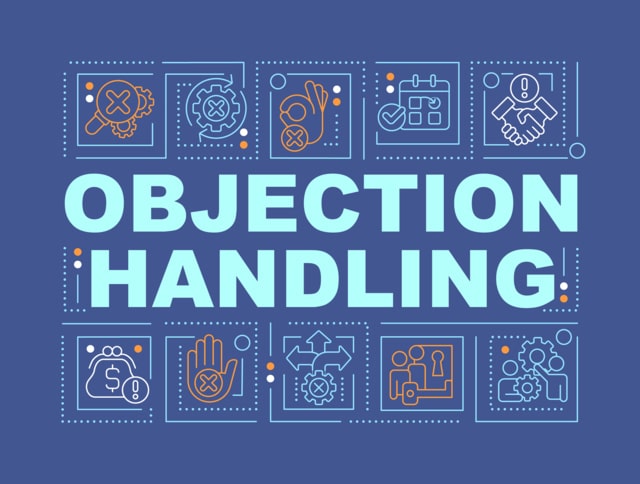Cold calling is a sales prospecting technique that many sales agents use in order to successfully close a deal. While this is a legitimate strategy that delivers results, it also leads to a high rate of rejections if not done politely or professionally. Cold calling objections are common, and this article aims to provide relevant tips, information, as well as ready-made scripts that you can use when handling sales objections and rebuttals in cold calling.
But first… What is Cold Calling?
Sales representatives, sales agents, and telemarketers employ cold calling as a strategy to reach out to individuals or businesses, presenting previously unexpressed product or service offers. The term “cold” reflects the absence of prior rapport, as these calls target individuals without pre-existing relationships. While often conducted via phone, cold calling also applies to salespeople initiating contact through social media, instant messaging, unsolicited emails, and door-to-door visits.
The purpose of cold calling is to generate leads, make sales, or simply gather information about potential customers or their feedback regarding a product, service, or brand. Typically following a script or pitch, the sales representative presents the product or service, highlights its benefits and key features, and convinces the prospect to make a purchase or take some desired action.
However, cold calling is often seen as intrusive and may lead to negative responses from the recipients, as many people consider it an unwelcome interruption to their day. Thus, the person on the other end of the line often expresses objections or rebuttals, prompting the sales representative to apologize, end the call, and lose sales.

Why Cold Calling Leads to Objections and Rebuttals
Because the process of cold calling involves reaching out to individuals without any prior connection or expressed interest in the products or services being offered, it often leads to objections, rebuttals, or rejections. Here are other reasons why cold calling objections and rebuttals happen
1. The sales agent lacks a prior relationship with the prospective buyer.
When a salesperson makes a cold call, the person on the other line often feels that it’s a random call, sometimes even regarded as “spam”, because there is no prior relationship or established trust between the caller and the prospect. As a result, the prospect may become doubtful of the salesperson’s intentions and view the call as an intrusion.
2. Cold calling is often regarded as an unsolicited contact.
Cold calls are unsolicited and done without consent, meaning the prospect did not actively or voluntarily seek information about the product or service being offered and did not ask to be contacted. This can make them caught off guard and feel imposed upon, often leading to resistance.
3. The timing of the cold call may be inconvenient for the prospect.
As they are not scheduled, cold calls may come at inconvenient times for the prospect and may not align with their current needs or interests. As a result, they may not see the value in the offering and raise objections or completely reject the call.
4. People generally have hesitations and fears toward something they didn’t ask for.
Many people have a natural aversion or hesitation to being “sold” something, especially if they did not actively ask about it or they don’t recognize the brand. Cold calls can trigger this defensive response and immediately object to the offer. Overcoming prospects’ doubts and skepticism, therefore, becomes a significant challenge for sales representatives in such situations.
5. Prospects’ lack of information about a certain product or service makes it difficult for them to make a quick decision.
When a prospect receives a call about a specific product or service that they don’t know about or are not interested in, they can either reject the offer right away or choose to listen to know more about it. However, since cold calls are unsolicited and the recipients are often not targeted, this can easily lead to objections and rebuttals.
Additionally, if the salesperson has limited knowledge about the prospect and their specific needs or pain points, the resulting conversation can be a generic pitch that fails to resonate with the prospect.
6. Prospects may be resistant to change.
Another reason for cold calling rebuttals is the prospect’s loyalty to their current brand or product. Even if the prospect is kind enough to take the call from the salesperson, they might be resistant to change from their current provider or method of doing things.
Overcoming cold call objections and rebuttals, therefore, should be a priority among sales representatives if they want to generate leads and make a successful sale. By being aware of these common reasons for objections, they can create a strategy and tailor-fit their script to ensure that they provide the right information to prospective buyers.

10 Common Cold Call Objections and How to Handle Each One Professionally
As a sales representative doing cold calls, you will encounter different kinds of objections, rejections, rebuttals, and negative responses from prospects, along with various reasons why they wouldn’t listen to or accept your sales offer. Below are 12 examples and simple but effective ways how to handle objections in cold calling.
1. “I’m not interested.”
People will always say they are not interested in the product or service you are offering for various reasons—either they don’t have time to listen to your offer, they are already using another brand or engaging in a similar method, or they don’t see any immediate value or need for what you are selling. Whatever their reasons are, know when to identify if the prospect expresses disinterest in what you’re saying, as this will give you a clue that the call won’t be successful and you have to switch your spiel to something more personalized and targeted to their need.
Here’s how to handle the objection: Acknowledge their response politely and try to understand their specific concerns. Ask open-ended questions to uncover potential pain points or challenges they might be facing. Then, tailor your pitch to address their specific needs and emphasize how your product or service can be beneficial to them.
2. “I’m too busy.”
This is one of the most popular responses of cold call recipients to quickly dodge the offer and end the call. Whether the prospect is indeed occupied with more important things or they are just using it as an excuse to avoid the conversation, you, as a sales representative, should be able to respond to this objection gracefully and strategically so the call won’t just be hung up.
Here’s how to handle the objection: Acknowledge that you know how precious their time is and that you genuinely respect it. Briefly explain the value they would gain from the conversation and assure them that the call won’t take much of their time. You can also offer to schedule a call at a more convenient time for them.
3. “It’s too expensive.”
If the prospect perceives your product or service as too costly, they would express their hesitation to invest their time and money in it. This objection is pretty straightforward, sending you the message that they can’t afford to buy or avail what you are offering and, therefore, should just end the call right away.
Here’s how to handle the objection: Acknowledge that you understand their concern and agree that it is valid. However, before accepting the objection, make sure to highlight the unique value and return on investment your product or service can deliver. If possible, provide case studies or testimonials from satisfied customers who have experienced tangible benefits from using your offering.
Therefore, instead of simply focusing on the price tag, emphasize the gains that the prospect will receive and make them realize that the benefits they will get are far more valuable than the money they would spend on it.
Another way to deal with this kind of objection is to provide the customer with a discount or freebie if you have the authority to do so. By making them realize that they are getting more from what they actually pay for, they can be persuaded that your product or service may not be as expensive as they expect it to be.
4. “I don’t know you” and “Where did you get my number?”
Recipients of cold calls often get caught off guard because they don’t know who is calling them, or how the caller got their number, and they are not expecting any call related to that specific brand or product. Thus, they often question the legitimacy of the call, most likely leading to an objection or rebuttal.
Here’s how to handle the objection: Politely introduce yourself, mentioning which company you represent and what brand are you promoting. Be transparent about the source of their information and explain briefly why you believe your product or service could be relevant to them. If you can share reliable proof, ensure them that you and the brand you are representing are legit, and the conversation you’re having with them is not part of any scam or scandalous activity.
5. “I’m not the right person to talk to.”
In some cases, you could be talking to a prospect who claims that they are not the decision-maker or the relevant person to discuss your offering. This could be true; and if it is, continue with the conversation and simply ask about information that can help you make the call a successful one.
Here’s how to handle the objection: Politely ask for a referral to the appropriate person within their organization who might be interested or have the power to make a decision to buy. Alternatively, you can also share the information with them and let them relay it to the right person. Additionally, inquire about the decision-making process and offer to send materials via email that they can forward to the relevant party.
6. “I need more information.”
When you hear this objection, it could mean that the prospect is interested but not yet ready to make a decision because they don’t have enough information that would motivate them to buy. Upon encountering this objection, it might indicate the prospect’s interest, yet their hesitation to decide due to insufficient motivating information for a purchase. This can be a good sign because all you need to do is feed them with the right information to help them make an informed decision.
Here’s how to handle the objection: Learn more about the problems or pain points they currently experience and then provide concise but relevant information that addresses their immediate concerns in relation to the product or service you are selling. Moreover, ask what specific information they need in order to make a decision. Remember not to overwhelm them with unnecessary details, and simply offer to send more comprehensive materials via email or social media platforms.
7. “We are already using a certain product/service.”
This is one of the most common cold calling rebuttals because, more often than not, prospects do already use a specific product or service they are familiar with. Also, due to brand loyalty, they could instantly reject your proposal, especially if they already have a contract with a particular company. Making them switch to another brand, product, or service can be challenging for sales agents doing cold calls.
Here’s how to handle the objection: Express understanding for their loyalty to their current provider. Politely ask for some time to listen to your proposal, then focus on what sets your product or service apart. Highlight any advantages or improvements they could gain by considering your offer. Remember to do this professionally and avoid talking negatively against the other product or brand.
8. “We are not yet ready to buy.”
This could be due to several reasons, such as not having enough funds, not needing the product or the service at the moment, or there is missing information that needs to be presented before a decision can be made. Either way, make sure to understand what’s stopping them from buying and try to address their concerns promptly.
Here’s how to handle the objection: Respect their timeline and ask if there’s a specific reason for their delay. Offer to stay in touch periodically with relevant updates, so they know when to expect a call from you again.

9. “I’ve never heard of your company.”
If the prospect is unfamiliar with your company and is hesitant to engage in business with an unknown entity, take this as a good opportunity to introduce yourself, your company, and the brand you are representing to the person you are talking to.
Here’s how to handle the objection: Introduce your company briefly and highlight any notable achievements, awards, or client success stories. Offer references or testimonials from reputable clients to build trust and credibility. Encourage them to ask questions if they have any doubts or clarifications, and confidently answer them with accurate information that will help you close the deal.
10. “I’ll get back to you on this.”
You can interpret this objection in two ways: either the prospect requires more time to assess their choices before responding, or this might be a courteous method of declining your offer. Either way, the prospect wants to end the call without making any commitments to you and suggests they will contact you if they find the offer relevant or helpful to them.
Here’s how to handle the objection: Express gratitude for their time and willingness to consider your offer. Before ending the call, ask if they would be open to receiving further information or updates from you. Ensure that you are always available in case they have any doubts or questions that need to be clarified. Finally, provide them with multiple means to get back to you, such as via a cellphone number, email address, or instant messaging app.
Remember, cold call objection handling is a critical skill that sales professionals need to develop and master. To achieve this, learn how to be empathetic, listen actively, and tailor your responses to the prospect’s specific concerns to increase the chances of a positive outcome.
BONUS! Simple but Effective Sales Scripts You Can Use to Handle Cold Call Objections
While it is easier to apologize and simply end the call after hearing an objection, this will not help sales agents generate leads, make a successful sale, and reach their targets. Thus, if you want to be a successful sales professional, make sure to go the extra mile and handle cold calling rebuttals professionally and strategically to turn a rejection into a sale.
Here are some scripts you can use to handle common cold call objections and rebuttals
Script 1:
When the prospect says, “I’m sorry, I’m not interested in what you’re selling.”
Your response: “I completely understand. I’d like to share with you, however, that many of our clients initially felt the same way until they discovered how our product helped them. Can I take just a moment to share how we might do the same for you?”
Script 2:
When the prospect says, “I’m sorry but we are already using a product and we are satisfied with its features.”
Your response: “That’s great to hear you have a solution in place! Our product isn’t about replacing what you have, but rather enhancing it further. Many of our clients found that integrating our offering led to better improvements. Would you be open to exploring how we can complement your current setup?”
Script 3:
When the prospect says, “I can’t a decision right now. I need more information.”
Your response: “I completely understand and I respect your decision to take some time to review my offer. I also understand the importance of having all the details before you can make a decision. To make it easier, I can send you an email with comprehensive information about our offer. Meanwhile, let me give you a quick overview of how we’ve been helping companies through our product.”
Script 4:
When your prospect says, “I’m sorry but I’m not the right person to talk to about your offer.”
Your response: “No problem at all. I appreciate your honesty. Would you mind sharing who would typically handle this situation within your organization? I would love to connect with them directly and provide the necessary information to explore how our product can benefit your company.”
Script 5:
When your prospect says, “It sounds good, but I don’t need that right now.”
Your response: “I understand, timing is everything. While you might not need this at the moment, many of our clients found value in being prepared for future use. May I send you some resources so you can have them on hand when the time is right for you?”
Remember to personalize these scripts based on your product or service and adapt them to fit the prospect’s responses and specific objections during the call. The key to making these scripts work for you is to be genuine and respectful while demonstrating how your offering can benefit their needs.

Why Sales Agents Need to Learn How to Handle Cold Call Objections and Rebuttals
Aside from completing a sale and improving your conversion rate, there are other several reasons why sales agents need to learn how to professionally handle and overcome objections in cold calling. Below are some of them:
1. Build Rapport and Trust
Skillful objection handling demonstrates good qualities, including professionalism, empathy, and a genuine interest in the other person’s thoughts and opinions. If you know how to deal with objections thoughtfully, you can easily build rapport and establish trust with your prospects. Even if they don’t accept your offer at the same time you called them, they will surely remember you the moment they are ready to make a purchase.
2. Overcome Resistance and Fear of Rejection
As a professional sales representative, you have to overcome your fear of rejection and be able to break through resistance from prospective clients. If you let nervousness and doubts defeat you, you won’t be able to be successful in your sales career. By learning how to professionally handle cold call objections, it will help you become more confident in your skills as a sales professional.
3. Enhance and Showcase Product Knowledge
Mastering cold calls and overcoming common sales objections strategically are not always about closing deals. If you don’t turn a prospect into a lead, at least you get to improve the way you communicate with them and showcase your knowledge about product presentation. This also helps you boost your confidence in understanding the brand you are representing and the value of the product or service you are offering.
4. Develop Adaptability and Resilience
Objections are a natural part of cold calling, and learning how to handle them will help you develop adaptability and resilience. Instead of becoming discouraged, you can turn every rejection into a learning experience, encouraging yourself to refine your approach and improve future interactions with prospects.
5. Learn to Tailor Your Sales Pitches
Cold calling objections help sales professionals further improve their techniques and create a compelling sales pitch that is tailored according to the specific needs and pain points of their prospects. By handling objections effectively, you get to learn how to tailor your spiels to better align with the prospect’s specific requirements, increasing the chances of a successful sale.
Therefore, learning how to handle cold call objections and rebuttals thoughtfully is an essential skill that sales agents like you need to learn and develop. Not only can it help you make a successful sale, but also enhance your communication and presentation skills, as well as your ability to adapt and overcome your fear of rejection.
Wrapping It Up
In the ever-changing landscape of sales and marketing, the skill of handling cold call objections and rebuttals is an invaluable asset for sales reps, sales agents, and even marketing professionals. Mastering this skill can lead to successful sales endeavors. Handling and overcoming cold call objections not only increase conversion rates but also showcases your professionalism, confidence, and other valuable qualities, such as resilience, adaptability, and resourcefulness.
Sales professionals should take time to hone their skills and develop qualities that will help them navigate the challenges of cold calling and contribute to the overall success and growth of their organizations. If you are a sales professional looking to grow your career or explore opportunities around you, Sales Recruiters Dallas can help you with your journey. Search for sales jobs in our online portal or submit your resume and get notified when an employer considers you for a sales job in Dallas.
Whether you wish to apply to sales jobs that require cold calling or other forms of sales strategies, our sales recruiters in Dallas can help you find what you’re looking for to succeed in your sales career. Good luck!

